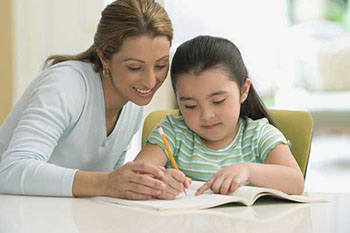(单词翻译:单击)

Parents in Spain are being urged to go on a weekend homework strike this month in protest against the unacceptable amount of after-school tasks their children are given.
西班牙的父母们受到鼓舞,准备于本月进行周末作业罢工,以此抗议学校给孩子布置的课外作业“过于繁重”。
The homework load of Spanish children has long been a sore point with some parents, who argue that the burden is too great, places too much pressure on pupils and eats into family time.
长期以来,孩子的作业负担一直是一些西班牙父母的心头之痛。他们提出,过重的作业负担给孩子们造成了巨大压力,侵占了他们的家庭时间。
According to a 2012 study by the Organisation for Economic Co-operation and Development, Spanish 15-year-olds have 6.5 hours of homework a week compared with an average of 4.9 across the 38 OECD countries.
根据经济合作与发展组织(OECD) 2012年进行的一项调查,西班牙15岁的孩子平均每周花6.5小时写家庭作业,相较而言,经合组织38个成员国的平均数据是4.9小时。
The Spanish Confederation of Associations of Mothers and Fathers of Students (Ceapa) has decided that enough is enough and is calling on parents whose children attend Spanish state schools to boycott weekend homework in November.
西班牙学生家长协会联盟(CEAPA)觉得受够了,他们正呼吁公立学校的学生家长在11月联合抵制学校给孩子布置的周末作业。
"We've lost a bit of common sense in this country when it comes to talking about education and we've got a system in which boys and girls free time has disappeared", said Jos Luis Pazos, president of Ceapa.
“说起教育,我国教育界缺乏一点基本常识。在我们的教育制度下,无论男孩女孩,他们的课余时间都被剥夺精光。” CEAPA主席何塞.路易斯.帕索斯说。
"Schools are passing on tasks to families that they shouldn't be."
“学校正把教学任务转交给家长,这本不是家长的任务。”
"It starts with children from the ages of three to six doing half an hour's homework every day."
孩子从三岁开始,每天要做半小时作业,一直持续到六岁。
"For us, that's an unacceptable situation". Pazos said Ceapa disagreed profoundly with the notion that children should endure huge amounts of homework in the hope that it would ensure them a better future.
“这对我们家长来说是不可接受的。” 帕索斯指出,CEAPA非常不赞同为了确保孩子有更美好的未来而给他们布置大量作业的教育理念。
"They should be happy when they're little and learn that life isn't just about someone telling you that you have to suffer inexplicably", he said, adding:
“孩子的童年应该过得快乐,他们应该明白,生命不只是听从摆布去忍受一些莫名其妙的事。”
"The model needs to change because society has changed." Schoolchildren have to fit their homework around the school day, which varies from region to region and school to school, but starts early from around 8am or 9am and finishes anywhere between 2pm and 5pm (with a long lunch break).
他补充道:“社会在改变,教育制度也亟需变革。” 学龄儿童必须适应学校布置的作业。不同地区和学校的上学时间安排不同,但一般是早上8:00或9:00上课,午休时间很长,放学时间介于14:00到17:00之间。
However, schools are increasingly using an 8am-2pm timetable to save money and in the face of evidence that suggests the longer hours do not yield better results.
有证据表明,更长的学习时间并不能换来更好的成绩,然而越来越多的学校对此视而不见,为减少开支而采用8:00-14:00的时间表。
Ceapa, which represents 12,000 parents associations, said the strike had received support from both parents and some teachers.
CEAPA代表了12000名父母,他们说这次行动已经得到学生家长和某些教师的支持。
Parents waiting to pick up their children from the Padre Coloma infant and primary school in eastern Madrid on Wednesday afternoon said finding the right balance between homework and family life was sometimes tricky.
Padre Coloma幼儿园和小学位于马德里东部。周三下午,家长等在校门外接自己的孩子。他们说找到家庭作业与家庭生活之间的平衡点有时挺难的。
Patricia Ruiz said her eight-year-old son would be getting five tasks this weekend, which would take him about an hour and a half - long enough to cause arguments.
帕特里夏.鲁伊斯说,她八岁的儿子这周末要做五项家庭作业,得花约一个半小时才能完成,这足够引发争论。
"I spend the whole day trying to get him to do his homework otherwise he'll be punished", she said.
“我要用一整天时间来督促他完成作业,否则他会在学校受惩罚。”她说。
Ricky Prez, a security worker, said he thought the school was giving pupils about the right amount:
里基.佩雷是一名安检人员,他认为学校布置作业的量恰到好处:
"It's a normal level of homework here; they're not doing it all day". Beatriz Velsquez, who works in cleaning, reckoned children now ought to be counting their blessings.
“正常情况下,我国的家庭作业就是这么多。孩子们又没有整天做作业。” 比阿特丽斯.贝拉斯克斯是名清洁人员,她认为如今的孩子应该知足。
"When I went to school, we had homework all week and at weekends about 14 hours a week [in total]", she said.
她说:“我上学那会,我们一周七天都要做作业,每周做作业的时间总计大概有14小时。”
"My children have it easier as they don't have as much as I did, or as much as they do at other schools."
“我的孩子做的作业既没我上学时多,也比不上其他学校,所以他们完成得比较轻松。
"They have time to play, which is the most important thing."
“他们有玩的时间,玩才是最重要的。”
"They need to study, but they also need to have the time to be kids".A spokesman for the education department of Madrid said homework was a matter for individual schools rather than regional governments.
他们需要学习,但他们也应该有时间享受童年。” 马德里教育部门一位发言人说,作业问题应由各个学校,而不是当地政府来负责。
"They're the ones who know best what the need is in each case", he said.
“只有学校才最了解自己该做什么。”他说,
"It's a question of autonomy: the teachers know what the needs of every student and every class are.
“这个问题需要学校自主解决:只有老师了解每个班及每名学生的需求。”


